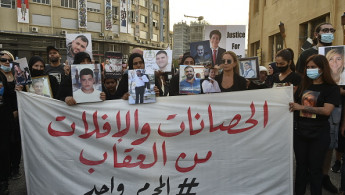Three years on, official death toll from Beirut port blast still unclear
It has been three years since a devastating explosion tore through Lebanon's capital, and with no official count, the death toll remains unclear.
More than 200 people have died since the explosion at the Beirut port on August 4, 2020. Among the casualties are people who passed away weeks, months, or even years after the blast. Some of the victims remain in a coma, or possess life-threatening injuries.
But as the exact death toll remains unknown, local and foreign media outlets have continued to give mere estimations.
Lebanese authorities have failed to provide an exact count, and the state – accused of negligence for what led to one of the world’s largest non-nuclear explosions – stopped counting around a month after the blast.
The government said the disaster was triggered by a fire in a warehouse where a vast stockpile of industrial chemical ammonium nitrate had been haphazardly stored since 2013. Then-interior minister Mohammad Fahmi promised that investigations would be finalised in five days.
Three years later, no one has been held accountable, and the internal probe has been blocked by the governing elite.
Among the casualties were not just Lebanese citizens, but nationals of other countries. Refugees from Palestine and Syria, migrant workers from Africa and South Asia, and the wife of a European ambassador died in the horrific blast.
Authorities have been accused of discriminating against foreigners, especially refugees and migrants in the search for victims. Some bodies remained unidentified, with no loved one or embassy claiming them.
In-depth: Legal advocates are pursuing multiple routes for justice for Beirut port blast victims at the international level
— The New Arab (@The_NewArab) August 3, 2023
✍️ @will_christou https://t.co/3xL69Pb88N
A Lebanese group called the Anti-Racism Movement said that among those killed were at least 76 non-Lebanese citizens, including 52 Syrians. Lebanon is home to more than 1.5 million Syrian refugees, and a figure given by the General Security apparatus says there are more than 2 million Syrians in the small Eastern Mediterranean country.
Maan, a Lebanese group advocating for victims and survivors, put the death toll at 236, significantly higher than the government's count of 191.
Among those listed as dead by Maan is Qusai Ramadan, a Syrian infant whose parents say was killed when the explosion toppled the ceiling and a cupboard in his hospital room, crushing him.
The parents have been unable to get the infant added to the official death list, a move that could have made them eligible for future compensation.
Other rights groups including Amnesty International and Human Rights Watch also agree that the number of people who died stands at above 230.
Other estimates say the death toll surpasses 250.
Just as NGOs and other private initiatives helped rebuild damaged neighbourhoods in Beirut, it has been up to activist groups to keep count of the dead, cooperating with hospitals, the families of victims, journalists and more sides.
(Agencies contributed to this report)





 Follow the Middle East's top stories in English at The New Arab on Google News
Follow the Middle East's top stories in English at The New Arab on Google News


